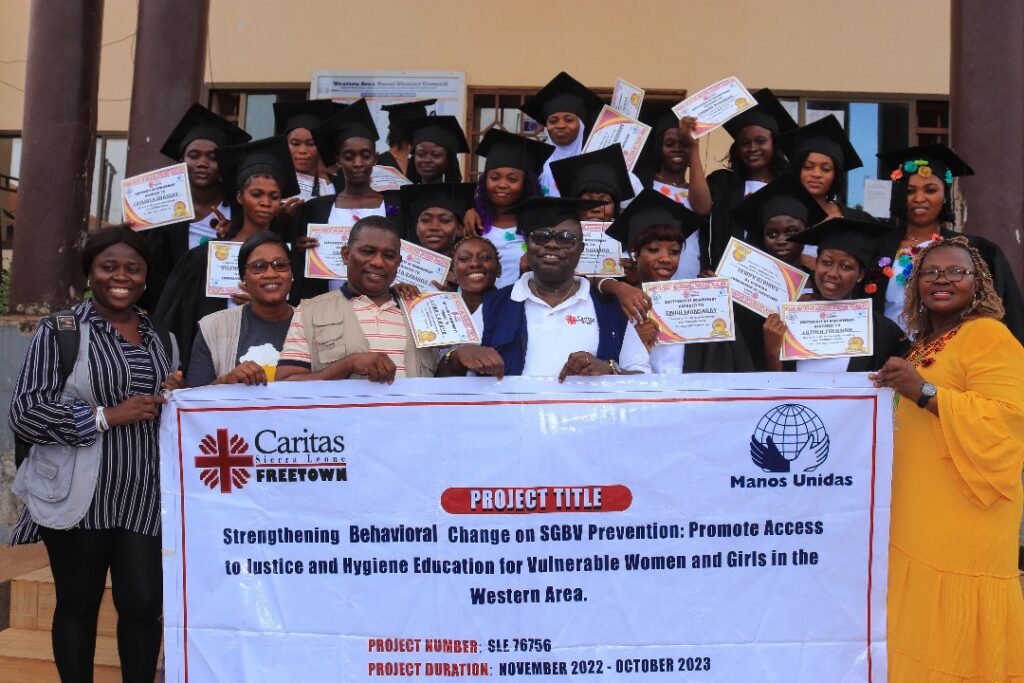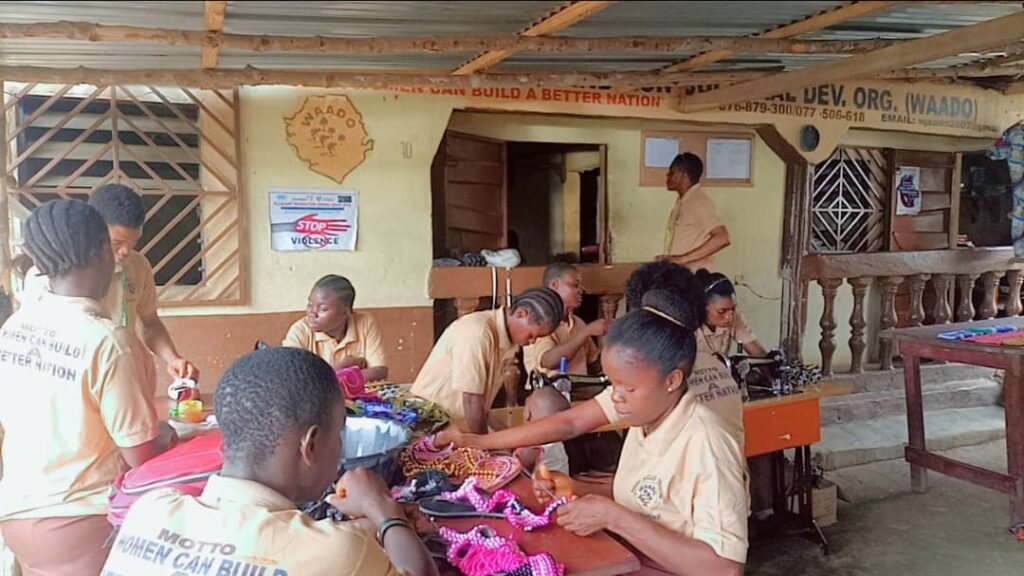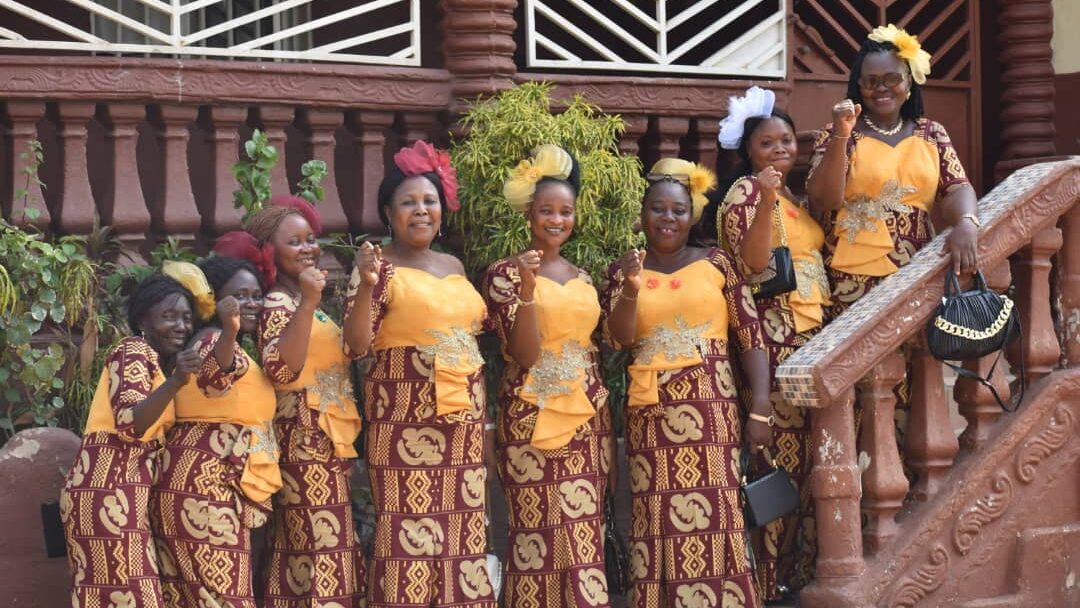Article by Doris Fatima Webber (WAADO) and Sera Bulbul (MCLD)
In the heart of Sierra Leone, a story of resilience, empowerment, and unwavering dedication unfolds through the work of Doris Fatima Webber and the Women’s Advocacy and Agricultural Development Organization (WAADO). Having witnessed the devastation of the 11-year civil war that ended in 2002, Doris emerged as a beacon of hope for her community, channeling her experiences and passion into creating a force for positive change.
A Vision Takes Root: The Birth of WAADO
Sierra Leone’s civil war left rural communities of the country particularly devastated. In the aftermath, the focus on community development was minimal. In the early 2000s, as Sierra Leone began its slow recovery from the ravages of war, Doris’ career began. Volunteering at a local community school and working with the Sierra Leone Red Cross Society, she immersed herself in post-war rehabilitation efforts. Her subsequent role with the Pan-African NGO Forum For African Women Educationalists (FAWE) ignited her passion for advancing the rights of girls and women.
These initial steps were crucial in Doris’ path towards community service and advocacy. In April 2007, Doris took a bold step by founding the Women’s Advocacy and Agricultural Development Organization (WAADO), driven by the motto “Women Can Build a Better Nation.” Her vision was clear: to create a platform where the voices of the marginalized could be heard and where sustainable community development could flourish. Nearly 17 years later, WAADO stands as a testament to Doris’ commitment and the collective efforts of her team. Through WAADO, Doris and her colleagues advocate for the voiceless and address critical issues including education, gender equality and health.
Building Bridges: Partnerships and Collaborations
One of the most striking aspects of Doris’ work is her ability to forge meaningful partnerships and collaborations. Under her leadership, WAADO has established connections with a range of organizations and coalitions that have been instrumental in advancing its mission. Two years ago, WAADO became a member of the Movement for Community-led Development (MCLD) Sierra Leone, a significant milestone that opened doors to new opportunities for growth and influence.
In addition to MCLD, WAADO is a member of the Women’s Forum Sierra Leone which is the umbrella organization for all women organizations in Sierra Leone, the Forum Against Harmful Practices ( FAHP) and the 50-50 Group of Sierra Leone, an advocacy group dedicated to women’s empowerment in politics. Doris’ involvement in the Forum Against Harmful Practices demonstrates her commitment to addressing critical issues such as teenage pregnancy, early marriage and female genital mutilation. These partnerships not only amplify WAADO’s impact but also underscore Doris’ role as a leader in the fight for gender equality and justice.

Navigating Challenges: A Testament to Perseverance
The road to success has not been without its hurdles. Doris acknowledges that one of the biggest challenges facing WAADO is securing funding. Operating as a community-based organization in a rural setting brings expectations from the community to drive policy change and advocate for their needs, all while managing the constraints of limited financial resources.
Doris explains the complexities of accessing funds from larger organizations, which often require extensive documentation and financial audits. The protocols for accessing funds from larger organizations can be complex and demanding, often requiring extensive documentation and audits. Despite these hurdles, Doris remains steadfast, sometimes using her own resources to sustain WAADO’s operations.
This resilience is a cornerstone of her leadership and dedication to community development. Her dedication to serving humanity, particularly through women and girls’ economic empowerment, is both inspiring and commendable.
A Legacy of Impact: Celebrating Successes
Despite the challenges, Doris and WAADO have achieved remarkable successes. The organization’s ability to sustain itself for nearly two decades is a testament to its impact and effectiveness. WAADO’s success is also reflected in its international engagements, such as Doris’ participation in the G7 conference in Germany, and other conferences where she presented WAADO’s work to global audiences.
WAADO has built a platform for advocacy in Sierra Leone.
“There is a radio station that gives us air time once a week. We discuss emerging issues that are affecting women, girls and the general populace. For instance, now that we’ve just had the prohibition on Child Marriage Act 2024, we shall be popularizing it through our radio discussion programs.”
Doris Fatima Webber

Looking Ahead: The Future of WAADO
Looking ahead, Doris envisions a future where WAADO continues to thrive and expand its impact. Prioritizing agriculture, peacebuilding, and health, the organization aims to support children at risk, enhance educational opportunities, and provide healthcare and support for survivors of gender-based violence. Doris’ vision extends to improving community awareness on rights and responsibilities through continuous advocacy and sensitization efforts.
“I want to see improvements on everything that we have been doing in the areas of
health, livelihoods, education, peace building, and advocacy, which is our base. We are
working on so many issues in women and children’s rights, gender justice, agriculture,
and we want to see how we can scale up in our advocacy on those thematic areas.”
Doris Fatima Webber
The organization has prioritized agriculture as a key area for future development, in line with the government’s flagship program. WAADO has initiated backyard gardening projects and is focused on producing the Orange-Flesh Sweet Potato, which will be used to create nutritious porridge for anemic children.
In addition to agriculture, WAADO remains committed to peace-building and health initiatives. The organization is working to secure educational sponsorships for at-risk children and strengthen support for survivors of sexual and gender-based violence. Doris’ long-term goals reflect a deep commitment to enhancing health, education, and advocacy efforts for the community.
The Value of Community-Led Development
Doris’ engagement with MCLD Sierra Leone has been transformative for both her and the organization. The continuous learning opportunities provided by MCLD have reinforced the importance of community-led development and have enhanced WADO’s ability to lead and succeed in its initiatives. Doris’ experiences with MCLD highlight the value of international networks and the role of community ownership in achieving sustainable development outcomes.
She emphasizes that true success lies in community ownership and involvement from inception to implementation. This approach ensures sustainability and fosters a sense of responsibility and pride within the community.
“Since we became members of MCLD, we have been working more and more according
to the principles of CLD, which is to say that whenever you’re working in a community,
the community should take the lead. When you involve the community that you are
working in, you will succeed because you will see community ownership at play. And
even if the project is phasing out, the community will at the end be the owners of that
project because they’ve been part of it since its inception. When you allow the
community to take the lead, then you will succeed.”
Doris Fatima Webber
And because of MCLD, we have international links, which is positive, and I am sure it will continue to create positive impacts. MCLD is mobilizing communities around the continents, around the world.
A Vision for the Future
Doris’ work exemplifies the power of dedication, partnership, and community engagement in the realm of international development. Her story is a powerful reminder that with resilience and a collaborative spirit, it is possible to overcome challenges and create lasting change.
Doris’ journey and the work of WAADO illustrate the profound impact of dedicated grassroots efforts in post-conflict recovery and community development. Her story is a powerful reminder of the importance of resilience, partnerships, and community-led initiatives in driving sustainable development. For international development practitioners, Doris’s experiences offer invaluable lessons in the power of local leadership and the transformative potential of empowering communities from within.
As Doris looks to the future, her vision for WAADO continues to inspire and guide the organization’s efforts. Her commitment to advancing women’s rights, fostering community-led development, and addressing critical issues is a beacon for international development practitioners worldwide.
In celebrating Doris’ achievements, I am reminded of the profound impact that one person’s vision and perseverance can have on the lives of many. Her journey with WAADO is a testament to the transformative power of community-led initiatives and the importance of nurturing partnerships.


